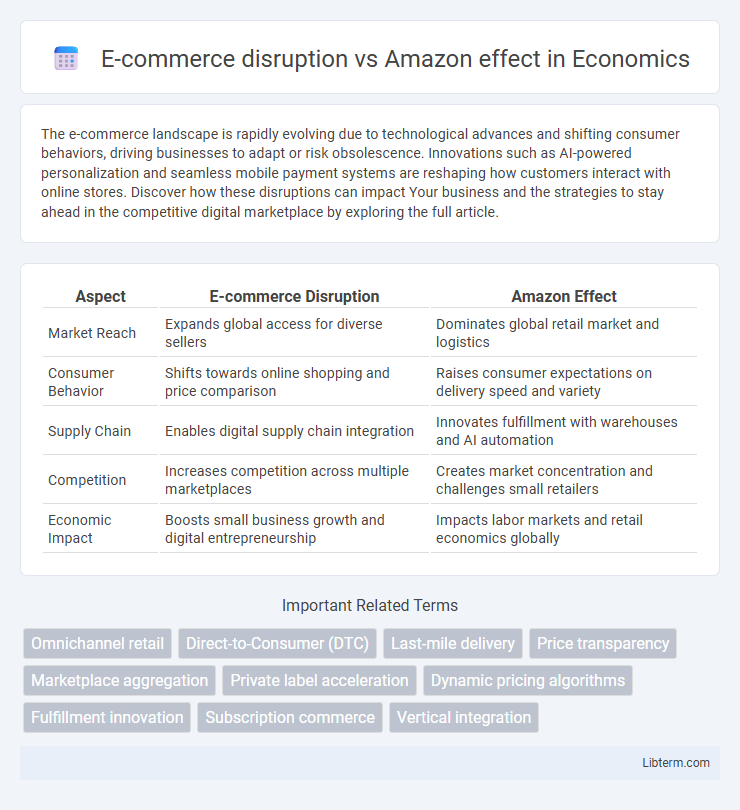The e-commerce landscape is rapidly evolving due to technological advances and shifting consumer behaviors, driving businesses to adapt or risk obsolescence. Innovations such as AI-powered personalization and seamless mobile payment systems are reshaping how customers interact with online stores. Discover how these disruptions can impact Your business and the strategies to stay ahead in the competitive digital marketplace by exploring the full article.
Table of Comparison
| Aspect | E-commerce Disruption | Amazon Effect |
|---|---|---|
| Market Reach | Expands global access for diverse sellers | Dominates global retail market and logistics |
| Consumer Behavior | Shifts towards online shopping and price comparison | Raises consumer expectations on delivery speed and variety |
| Supply Chain | Enables digital supply chain integration | Innovates fulfillment with warehouses and AI automation |
| Competition | Increases competition across multiple marketplaces | Creates market concentration and challenges small retailers |
| Economic Impact | Boosts small business growth and digital entrepreneurship | Impacts labor markets and retail economics globally |
Understanding E-Commerce Disruption
E-commerce disruption reshapes traditional retail by introducing innovative technologies such as AI-driven personalization, seamless mobile shopping, and advanced logistics that enhance customer experience and operational efficiency. The Amazon effect intensifies this disruption by setting high standards for fast delivery, vast product selection, and competitive pricing, forcing competitors to adopt similar strategies or risk obsolescence. Understanding e-commerce disruption requires analyzing shifting consumer behaviors, emerging digital tools, and evolving market dynamics that collectively redefine how products are marketed, sold, and delivered.
Defining the Amazon Effect
The Amazon Effect refers to the transformative impact Amazon has had on e-commerce by setting new standards in customer expectations, logistics efficiency, and product availability. This disruption compels retailers to innovate rapidly, integrating advanced technologies such as AI-driven personalization and same-day delivery services. The Amazon Effect redefines competitive dynamics, pushing businesses to prioritize seamless user experiences and aggressive pricing strategies to survive in a highly digital marketplace.
Key Drivers Behind E-Commerce Evolution
The key drivers behind e-commerce evolution include technological advancements such as AI-driven personalization, mobile commerce proliferation, and enhanced logistics networks that enable faster delivery and improved customer experience. The Amazon effect intensifies market competition by setting consumer expectations for seamless omni-channel shopping, competitive pricing, and extensive product variety, driving retailers to innovate continuously. Digital payment solutions, data analytics, and social commerce also play pivotal roles in reshaping online retail landscapes, fostering a disruptive ecosystem transforming traditional commerce models.
Amazon’s Role in Shaping Online Retail
Amazon's role in shaping online retail is pivotal, driving significant e-commerce disruption through its vast product selection, competitive pricing, and advanced logistics network. The company's innovation in customer experience, including personalized recommendations and one-click purchasing, sets a high standard for competitors worldwide. Amazon's marketplace model empowers third-party sellers, expanding product variety while reinforcing its dominance in the digital retail ecosystem.
How Traditional Retailers Respond
Traditional retailers counter e-commerce disruption and the Amazon effect by accelerating their digital transformation, investing heavily in omnichannel strategies, and enhancing the in-store customer experience with technology like augmented reality and personalized services. Many adopt data-driven inventory management and leverage artificial intelligence to optimize supply chains and personalize marketing efforts. Strategic partnerships, private label expansions, and quick delivery options are also crucial tactics to retain customer loyalty and compete effectively against Amazon's dominance.
Technology Innovations Fueling the Shift
The e-commerce disruption driven by technology innovations such as AI-powered recommendation engines, advanced logistics automation, and seamless mobile payment systems intensifies competition beyond the Amazon effect. Machine learning algorithms enhance personalized shopping experiences, while drone deliveries and IoT-enabled supply chains streamline order fulfillment, raising industry standards. These breakthroughs enable emerging players to challenge Amazon's dominance by offering faster, more customized, and cost-efficient services.
Impact on Consumer Behavior
E-commerce disruption has revolutionized consumer behavior by enabling instant access to a vast array of products with competitive pricing and personalized shopping experiences. The Amazon effect intensifies this transformation, raising expectations for fast delivery, seamless returns, and customer-centric services that drive higher purchase frequency and brand loyalty. Consumers now prioritize convenience, product variety, and real-time reviews, fundamentally shifting the retail landscape toward digital-first interactions.
Market Winners and Losers
E-commerce disruption has reshaped retail markets by empowering nimble startups and niche brands to capture market share previously dominated by traditional retailers, while Amazon's scale and logistics prowess have solidified its position as a market leader. Small and medium-sized businesses leveraging digital platforms often emerge as winners by reaching broader audiences, whereas brick-and-mortar stores and inefficient supply chains face significant losses. The Amazon effect intensifies competition, pressuring margins and forcing market players to innovate or exit.
Strategies to Compete with Amazon
E-commerce disruption driven by Amazon's dominance compels retailers to adopt hyper-personalization and leverage AI-powered customer insights for targeted marketing. Emphasizing unique product assortments, exclusive brand collaborations, and superior customer service builds differentiation against Amazon's vast inventory and efficient logistics. Investing in omnichannel experiences and last-mile delivery innovations enhances convenience and customer loyalty in an Amazon-competitive landscape.
The Future of E-Commerce Post-Amazon Effect
The future of e-commerce post-Amazon effect will be shaped by increased emphasis on personalized customer experiences and advanced AI-driven logistics. Emerging technologies like augmented reality and blockchain will enhance transparency and engagement, while smaller retailers leverage niche markets through innovative platforms, challenging Amazon's dominance. Sustainability and ethical supply chain practices will become critical differentiators as consumers demand more responsible e-commerce solutions.
E-commerce disruption Infographic

 libterm.com
libterm.com